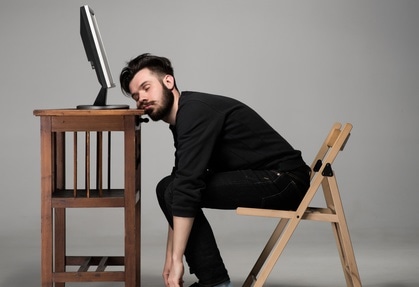Awake Apnea

We hear a lot about sleep apnea these days, but apnea—the cessation of breath—is happening to nearly all of us, all the time. It’s awake apnea, brief periods during the day when we stop breathing or drop into shallow respiration, barely breathing.
I notice breathing much more these days since I was diagnosed a few months ago with sleep apnea. I did the sleep study—hooked up to multiple sensors—fully expecting to be exonerated, but my doctor’s hunch (seconded by my wife) was confirmed: During the test I stopped breathing for 20 seconds. Seven times an hour! It seemed impossible, but the report wasn’t lying. (Some apneas can last not seconds but minutes, and events can occur 30 or 50 times an hour.)
At a recent conference a presenter spoke of “phone apnea.” We stop breathing, she said, when we are frantically scrolling down a message or hunched over, thumbs akimbo, banging out a text. Linda Stone, a former executive at Apple and Microsoft first noticed how people, perhaps 80%, unconsciously hold their breath while typing a response to an email or text. She dubbed it “screen apnea.”
Because my breath awareness has been recently heightened, I immediately recalled moments when I had failed to breathe. I would be staring at my laptop screen, pondering my next line, and realize that I was paralyzed at the end of an exhalation. It was time to inhale, but I wasn’t. Until now I hadn’t thought how odd—or unhealthy—that was.
There’s a reason health insurance pays for CPAP machines for people with sleep apnea. Bad things happen when we stop breathing. As my doctor explained: oxygen drops, CO2 rises, heart races—finally we gasp for air—adrenaline rushes, blood pressure spikes. That wild ride triggers negative reactions in body and brain.
It’s good that we’re able to diagnose and prevent the apneas that occur in sleep. But what about the ones that strike while we’re awake? When we are angry or frustrated or blitzed by fear we stop breathing, or we drop into a shallow pant. Somehow we need to maintain breath awareness. When we are in crisis—real or imagined—it helps to have someone who can say, “Remember to breathe.” It’s crazy simple. As Zen monk Thich Nhat Hanh says, “Breathing in, I know that I am breathing in. Breathing out, I know that I am breathing out.”
Today an app on my wrist invites me to stop and breathe for two minutes. TWO MINUTES!, I think. I can’t stop liking random Face Book posts for TWO MINUTES! Against my own will I stop. Inhale deeply, exhale. After a minute, Pam, who is sitting in the armchair next to me asks what I am doing. A breathing exercise, I whisper on the out breath. It feels funny, it feels long, until it feels quiet and calm, satisfying, like a long drink of cold water in August.
David, Tom took the test last year and was diagnosed with “mild” sleep apnea – he’s scared me to death for years with these episodes – what is even more interesting, albeit scary, is the fact that by chance I mentioned this problem ( prior to a sleep study diagnosis) to the ER doctors when he had blood clots in his lung, and they were trying to figure out a cause. When they heard sleep apnea, they said that played a major role in his A-fib. Great piece – will share with Tom💖
Yes—it’s funny how many health issues are caused by apnea…but of course when you think about it, it’s not surprising that failure to breathe is not good for our bodies!
One of the best mediation practices I’ve found is the Jesus prayer; breathe in for the “Lord, Jesus Christ, son of God,” breathe out for “have mercy on me (a sinner).” It brings renewal of spirit and lowers my shoulders at the same time. peace, Johnna
Thank you – great way to incorporate the heart of my beliefs into this! God bless.
That’s a classic—thanks for reminding us of that beloved prayer—and offered with the breath.
Another gem, David. How strange that we must be reminded to breathe! But we do.
I recall when I learned diaphragmatic breathing. My voice teacher began by saying, “I’m going to teach you something you already know. As an infant you did it naturally but then you forgot.” He showed me how to place an open hand on my belly and then inhale. He said, “If your hand moves, you’ll know you’re doing it right.” Thanks to him, fifty years later I still breathe that way. When I remember to breathe.
I am so happy that you’re writing again David! We all miss you at St. Luke’s, but I’m relieved I can get a little bit of David on the internet. Now if only I can remember to breath … 🙂
I produce a TV series for Amazon Prime, a comedy called “Over My Dead Body,” and our upcoming episode features Julia Child. So I researched her flops in the kitchen and came across your piece on her from 2012. Then I became curious about other things you’ve written and came across this article. Funny thing, just today I was diagnosed with sleep apnea. I stop breathing 13 times per hour and now have the answer why I lost half the vision in my right eye. As soon as the CPAP machine arrives, that’s my future. Small world, and funny how things connect.